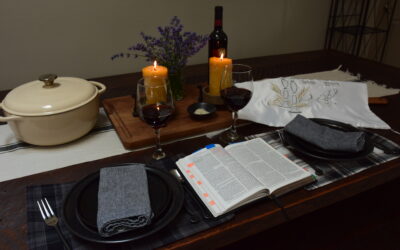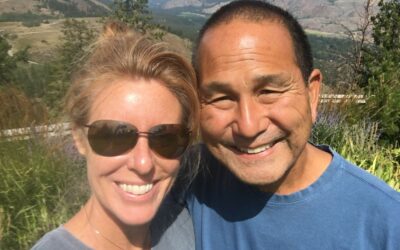These words took on an entirely new meaning as I stood in the visitor’s center at Pearl Harbor on December 7th, 2022, reading the plaque explaining America’s global position prior to the events which occurred on that very spot in 1941.

“In short, America, alone in a jealous and hostile world, would find that the effort and cost of maintaining ‘splendid isolation’ would be such as to bring about the destruction of all those values which the isolation policy has been designed to preserve.”
Joseph P. Kennedy, U.S. Ambassador to Great Britain, March, 1939.
A familiar chill ran up my spine–that feeling I get when the Holy Spirit is speaking. I read the plaque again. Then again. I took a photo of it. Because it wasn’t just about one moment in history or a handful of humans who erred. It wasn’t simply about politics or military strategies. Yes, America made grave errors that allowed the attack on Pearl Harbor to occur, and while this blog post is not intended to be a political statement, it is meant to be a personal one, and since strategic decisions are made by human persons, the point inevitably carries implications of a larger scale:
What we believe and how we act personally has ripple effects that reach beyond us, across the globe, and through eternity.
It is tempting to think of neutrality as peaceful, but passivity can be quite dangerous. As I processed the weight of those December 7th events and the words of Joseph P. Kennedy, God continued to drop truth bombs in my heart and mind.
When we isolate, even when we do so to protect something valuable, we risk losing not only the valuable thing but also ourselves and the purpose God created us to fulfill.
As a five on the Enneagram, my apparent vice is avarice. This revelation was perplexing and objectionable to me until, scrolling through social media at the airport waiting to board the plane home from Oahu, I stumbled upon a fitting definition of the word that indeed applies to me in every way.
“Avarice isn’t greed in the sense that a 5 wants more of something. 5s are often quite minimalist! This type of avarice is greediness of their current inner resources. They fear that too much interaction with others will be catastrophic for them. Thus in order to avoid this fear, the 5 will withhold themselves, hold onto their resources, and minimize their needs [in order] to prevent catastrophe.”
@Ennegramexplained
I will be the first to admit this source isn’t exactly academic, but there is truth in the words nonetheless. For the first time, I understood the anxiety I tend to battle and the walls I seem to build around myself, despite my deep love of people and my longing to give, share, and help. The inner struggle between faith and doubt, between love and fear, between intimacy and isolation, between benevolence and self-preservation–this struggle has been very real. Understanding myself in terms of this vice sheds real light on the constant contradiction that has been my life.
As a person of faith, I endeavor daily to open myself up to what God is doing, and yet there are moments, days, weeks even, when the urge to isolate and protect what God is doing in me from the brutal reality of the world is greater than my faith. If I put myself out there, if I step into the true identity God has for me and fulfill His calling, I risk attack from a cold, cruel world–one that includes people I love dearly and don’t want to lose. A world that claims to have the ultimate authority over my survival. And sometimes I fall victim to the lie that keeping to myself, minding my own business, living and letting live will ultimately serve God more effectively. Best not to stir the pot. Better not to offend or turn people off from Jesus by something I might say. And yet I know better. God can only work through me if what He is doing in me is visible and shared.
Non-involvement does not equate to non-violence.
At this my memory is tickled and my curiosity further kindled by some much earlier and far more credible words of wisdom from the book of Obadiah. James E. Smith labels it “callous noninvolvement” and claims one form of violence the Edomites committed against Jerusalem was that of “nonaction.” Because they failed to act on behalf of a brother in need, the Edomites were considered “as guilty as those who actually plundered Jerusalem” (The Minor Prophets).
“Because of your violence to your brother Jacob, you will be covered with shame, and you will be cut off forever. On the day that you stood aloof, on the day that strangers carried off his wealth, and foreigners entered his gate and cast lots for Jerusalem–you too were as one of them. . . . The day of the Lord draws near on all the nations. As you have done, it will be done to you. Your dealings will return on your own head.”
Obadiah 1: 10-11; 15
As tempted as we are to remain quiet, to keep out of it, to not get involved in affairs that aren’t ours, the King of Kings and Lord of Lords has a very different opinion of what we ought to do. It’s not good enough that we acquire our own–peace, prosperity, freedom, salvation, knowledge (fill in the blank)–and then quietly withdraw to protect it against those who might threaten it, or worse yet, to keep it from those who seek it for themselves. We serve a great God who has plenty of all the good stuff to go around.
Our job is to love everyone. Everyone. Not just those we like or the people who think and act and believe the way we do. Everyone is not neutral; quite the opposite: neutrality implies indifference, while everyone demands that we burn with a passion for the will of God and a love for our fellow man that cannot be quenched or stopped. Without God, there can be no love for everyone. Only through God’s love can we learn to love, and He demands that we love. There is neither room nor time for neutrality. Neutrality is an act of violence against our own spirit and that of our fellow man and the kingdom of God. If these words are difficult to swallow coming from me, meditate on the words of Christ:
“Not everyone who says to me, ‘Lord, Lord,’ will enter the kingdom of heaven, but the one who does the will of my Father who is in heaven. On that day many will say to me, ‘Lord, Lord, did we not prophesy in your name, and cast out demons in your name, and do many mighty works in your name?’ And then will I declare to them, ‘I never knew you; depart from me, you workers of lawlessness.’”
Matthew 7:21-23
Official neutrality, splendid isolation, avarice, callous noninvolvement . . . There are myriad terms and phrases for our tendency to wipe our hands of our spiritual responsibilities–obligations we have to ourselves, our brothers and sisters, and our God. Obedience is uncomfortable and often inconvenient, but not compared to a life that is unwilling to risk everything in the name of Christ. Consider the warnings we see in Revelation:
To the church at Ephesus:
“‘But I have this against you, that you have abandoned the love you had at first. Remember therefore from where you have fallen; repent, and do the works you did at first. If not, I will come to you and remove your lampstand from its place, unless you repent.'”
Revelation 2:4-5
To the church at Sardis:
“‘’I know your works. You have the reputation of being alive, but you are dead. Wake up, and strengthen what remains and is about to die, for I have not found your works complete in the sight of my God. Remember, then, what you received and heard. Keep it, and repent. If you will not wake up, I will come like a thief, and you will not know at what hour I will come against you.'”
Revelation 3:1-3
To the church at Laodicea:
“‘’I know your works: you are neither cold nor hot. Would that you were either cold or hot! So, because you are lukewarm, and neither hot nor cold, I will spit you out of my mouth.'”
Revelation 3:15-16
History, as well as prophecy, is meant to teach. Let us not go the way of our great American predecessors or those biblical leaders who erred so gravely over and over. Let us not fall victim to the tendency to shelter in place and hide the gifts we have been given, lest we lose everything in the process.
What does all this have to do with running a marathon? Simply this: Prior to Honolulu I ran alone. That was my comfort zone. I ran three or four miles at a time. That was my comfort zone. That’s what I thought was realistic, what I thought was possible for me. I’m not suggesting Jesus requires us all to run a 26.2 mile race with over 27,000 people, but I am encouraging us–all of us–to seek and accept the invitations He sends, no matter how random or uncomfortable or inconvenient they first seem.
Burn fiercely. Live fearlessly. Lay it all on the line in the hope of Glory–God’s glory.
Don’t think for a minute that we aren’t being tested in this lifetime for a far greater and more eternal assignment. Will we–will you–be found worthy of the praise: “Well done, good and faithful servant; you have been faithful over a few things, I will make you ruler over many things.” (Matthew 25:23)?




0 Comments